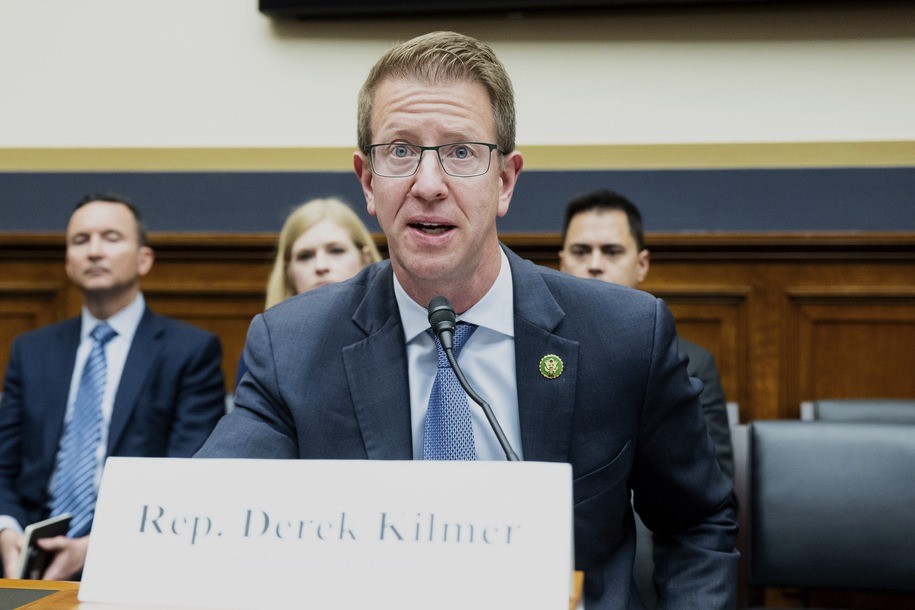
Who is Representative Derek Kilmer, and why does he make so much sense?
Fifty-two members of the US Congress are leaving: 44 members of the House and 8 members of the Senate. The New York Times interviewed 12 of them to answer some questions. It’s a sobering look at the state of the country’s legislature. However, one representative offers a chance of hope. Here are some of those conversations.
“Is Congress corrupt?”
Rep. Doug Lamborn (R-Colorado): “Congress is absolutely not corrupt.”
Rep. Tony Cardenas (D-California): “Both Democrats and Republicans, by and large, are trying to do what we believe we need to do for our districts and our constituents.”
“What was your most frustrating experience?”
Rep. Dan Kildee (D-Michigan): “…the environment seems to give permission to people to come to an understanding, to shake hands, and then erase all memory of that deal when it becomes convenient to do so. We’re at a budget standoff over the debt ceiling and Speaker Kevin McCarthy and President Biden negotiated a budget agreement. Then, Speaker McCarthy walked away from that agreement.”
Rep. Larry Bucshon (R-Indiana): “I think the most frustrating thing is when you have 300 co-sponsors to a bill, and you still can’t get that across the finish line.”
Rep. Doug Lamborn (R-Colorado): “… when the Republicans were not able to choose a speaker.”
Rep. Ken Buck (R-Colorado): “And then the frustration of being in the House and being told all the time that, ‘This is how you need to vote.’ The part of me that wanted to stick around because I believed we could get more things done died.
“What worries you most about the future?”
Rep. Ken Buck (R-Colorado): “We can’t sustain 34 trillion dollars of debt. Right now, the incentive is to spend all the money that we don’t have and put that burden on our grandchildren . . . A very simple solution—you need to change the incentive structure—for example, members of Congress don’t get a salary unless they balance the budget, or they don’t get to run for re-election unless they have reduced the amount of spending.
“Responsible government is the best way to move forward.”
“How do you fix Congress?”
Rep. Doug Lamborn (R-Colorado): “You’d have to change the American culture. You have to fix it at the root.”
Rep. Anna Eshoo (D-California): “It’s the American people that have to fix the Congress.
Rep. Larry Bucshon (R-Indiana): “Well, I think the American people have to fix it.”
Several Republicans and Democrats asked Representative Derek Kilmer, the Democrat from Washington state, for some answers.
“A lot of the time that I’ve spent here has been trying to figure out, what do you do?” Kilmer told The Times. “And Speaker Pelosi asked me to chair a committee called the Select Committee on the Modernization of Congress . . . We were nicknamed the Fix Congress Committee.
“It was a group of 6 Democrats and 6 Republicans, and it went over four years. And we looked under the hood of the institution and tried to propose reforms to make Congress work better for the American people. . . we looked a variety of issues, including how do you have a more civil and collaborative institution?
“We had one hearing where we invited a political scientist, management consultant, organizational psychologist, marriage counselor—I thought about bringing in an exorcist.
“I set up time with this football coach who took over a team that had a notoriously corrosive culture, and he turned it into a winner. And I said, ‘Coach, what do you do when you have players on the team that are trying to sabotage the team?’ And he said, ‘Well, I cut’em.’ I said, well, we really don’t have that option.
“And then he asked me a question. He said, ‘How do you do new player orientation?’ Much of the orientation process is in keeping the two parties from talking to each other. Okay, Democrats, you get on this bus, Republicans, you get on that bus. And this coach said to me, ‘Well, I don’t know much about Congress, but it seems like you ought to stop doing that.’
“And this last year, the orientation process actually involved Democrats and Republicans going through orientation together. Someone could look at that and say, ‘Great job, Kilmer. Congress is fixed.’ Obviously, that’s not the case.
“I’m reminded of a conversation I had with the House chaplain during 15 rounds of votes for the Speaker of the House. And I said, pray harder. And she put her hand on my elbow and said, ‘Just imagine how rough things would be if I wasn’t praying this hard.’
“So that’s how I look at the work of the Modernization Committee. We passed 202 recommendations. And I actually think, over time, you’re going to see some positive change within the institution as a consequence of that work.”
Now all Congress needs is the character and courage to act on the committee’s recommendations.
Representative Kilmer is not seeking re-election.
Comments










